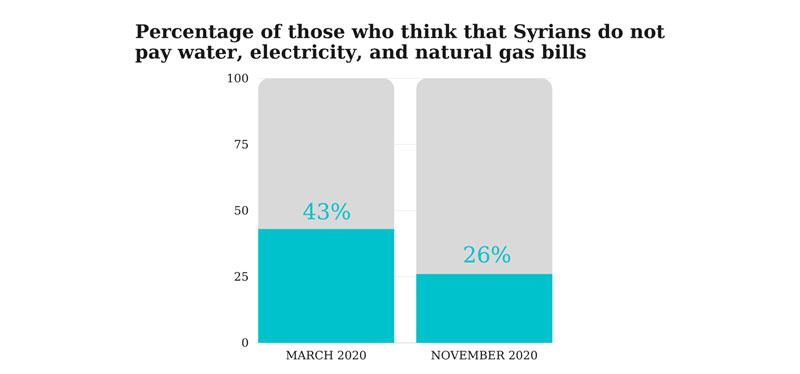PRESS BULTEN
22 March 2021
The power of interaction: Our attitudes turn more positive as we get to know each other.
The results of the Human Development Monitor Research Study, conducted by INGEV TAM in cooperation with ISTANBUL BILGI UNIVERSITY FACULTY OF COMMUNICATION, emphasized the importance of interpersonal interactions and getting to know each other when it comes to reducing the sense of tension and misinformation towards Syrians in Turkey.
The study indicates that the relationship between members of the local community and Syrians under temporary protection in Turkey is rather tense but the tension is on a downward trend in comparison to previous survey periods. It is thought that Covid-19 pandemic is also a factor in this trend as it pushed other social issues to the back of people’s minds. The study also revealed that, although local community members have a lot of misinformation about the benefits provided to the Syrians in Turkey, this level of misinformation is decreasing. Another important finding had to do with differences between those who have a Syrian acquaintance and those who don’t. Those who know at least one Syrian person tend to possess more positive attitudes towards Syrians in general in comparison to those who do not know any Syrian individuals at all.
Covid-19 Pushes the Refugee Issue to the Back of our Mind
The last period of the ongoing research study was completed in November-December of 2020. According to the findings, the tension between Syrian refugees and the host community has steadily improved since the first time the survey was conducted in July 2019. The social tension rate was 55% in the first period of the research, it decreased to 48% in the second period (March 2020) and to 32% in the last period (November 2020).
The rate of parents who do not want their children to befriend a Syrian under temporary protection decreased from 51% in the first period to 44% in the last period of the study.
It’s also possible to say that since Turkey’s opening of border crossings to Syrians on 28 February 2020, political discourse has influenced the perception of harmony in society.
On the other hand, Covid-19 has also become a hot topic in Turkey like in the rest of the world. One factor for the decrease in sense of tension could be the emergence of the pandemic. The perception of tension towards Syrians under temporary protection loomed comparatively less in people’s minds throughout the second half of 2020. As a result, the sense of tension that was previously visible in our social perceptions remained in the background and tended to show a quantitative decline in the survey.
Another result that showed a significant difference and improvement compared to the first period was the society’s approach to Syrians under temporary protection. The rate of those who consider Turkey embracing people under forced migration to be an exemplary humanitarian stance has increased from 40% (in the first period) to 62% (in the last period.)
Those Who Have a Syrian Acquaintance Are More Positive
One of the critical findings of the study is that the perception towards Syrians under temporary protection shows significant variation between those who have Syrian acquaintances and those who do not.
One issue where those who know at least one Syrian person and those who do not differ from each other is the rate of agreement with the statement “Syrians should be ensured to return to Syria as soon as possible”. 68% of those who have a Syrian acquaintance agreed with this statement while the rate was 77% for those who don’t.
The percentage of those who agree with the statement “Our country’s embracing of refugees is an exemplary humanitarian stance” is also higher among those who have a Syrian acquaintance (66% to 58%).
Those who have a Syrian acquaintance agree with the statement “We should make a greater effort to help Syrians adapt to our country” at a higher rate as well (37% to 25%).

Compared to the previous period, the rate of agreement with misconceptions about Syrians under temporary protection shows a general decrease among the host community. The most widely believed misconception regarding Syrian refugees is the belief that Syrians receive salaries from the Government. 54% of the public states that they agree with this statement. Although this aid is provided by means of the Turkish Red Crescent and public banks; it comes from the EU’s Social Cohesion Assistance fund, and only refugees who are registered and meet the relevant conditions can benefit from this assistance.

The most critical decline in misconceptions occurred in the perception that “Syrians can enter the university they want without an exam”. While 60% of the society agreed with this statement in March 2020, in November 2020 this rate decreased to 39%. In fact, foreign students who want to study at a state university can only make a selection according to their score by taking the “Foreign Students Exam” while private universities apply their own exams for foreign students.

The least commonly held misconception is the belief that “Syrians do not pay for water, electricity and natural gas.” Compared to the previous period, the proportion of people holding this belief decreased from 43% to 26%. The truth is that Syrians are not subject to a different practice than the host community.
Like many other studies, this study supports the importance of interaction and getting to know each other in order to reduce the feeling of tension in the society. In order to minimize the negative effects of misinformation about Syrians, many official institutions continue their struggle against such misinformation and according to the results of the research, this struggle progresses with positive results.
Contact: INGEV- 0216 540 50 21
INGEV TAM (Social Research Center): can.cakir@ingev.org
The study was carried out between 22 October – 20 November 2020 through computer assisted telephone interviewing method in a total of 26 cities (Turkey Representation) according to TSI Statistical Territorial Units Classification Unit 2. 1774 interviews were conducted within the scope of the study. The margin of error of the research is ± 2.3%.
